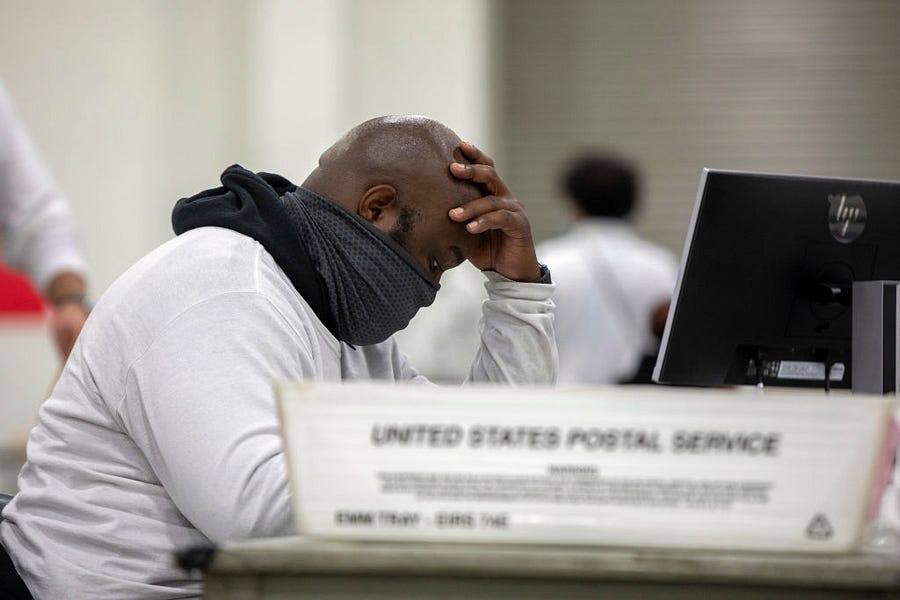Widely shared social media posts claim that Michigan has authorized “a forensic audit” of the 2020 presidential election. One Facebook post reads: “After a preliminary audit of Dominion machines in Antrim County turned up MAJOR fraud Michigan now wants a full forensic audit.”
Michigan has not authorized an audit of the 2020 presidential election and an earlier audit of Dominion machines in Antrim County, Michigan, did not find evidence of voter fraud in the election.
In an email to The Dispatch Fact Check, Tracy Wimmer, spokesperson for the Michigan Department of State, said: “[N]o new audits are planned.” Wimmer also added: “We conducted more than 250 around the state and those were completed months ago, and all affirmed the integrity and accuracy of the election.”
On March 2 of this year, Secretary of State Jocelyn Benson released a statement saying that those 250 audits had been completed and, according to the statement, “every one of them confirmed the integrity and accuracy of the 2020 general election.” Benson also said in that same statement that: “officials also audited every ballot cast for president in Antrim County and found that the Dominion machines used there accurately counted ballots throughout the county. Officials also conducted a statewide audit exercise, by hand-counting votes cast for president on more than 18,000 ballots randomly selected across the state, which affirmed the outcome of the presidential election as previously determined by tabulation machines.”
Antrim County has been the subject of many allegations of voter fraud in the 2020 election, none of them proven. The Antrim county audit report mentioned in the viral social post refers to a forensics audit report from December 2020 conducted by Allied Security Operations Group and signed by Russell James Ramsland, a former Republican congressional candidate. It’s also worth noting that Ramsland has had a history of promoting baseless voter fraud claims.
Michigan Judge Kevin Elsenheimer ordered “forensic imagining” of Dominion Voting Systems after an Antrim County resident, William Bailey, challenged the integrity of the voting technology in a lawsuit, reported the Detroit Free Press. In his lawsuit, Bailey cited errors in the way Antrim County had reported its unofficial voting results.
As we explained in an earlier fact check, the forensics audit report did not prove there was voter fraud.
The error in the unofficial polling results, cited by Bailey, was simply a human error,and not a software or technology malfunction. It’s also worth noting that the error was quickly corrected and did not impact official results.
Benson explained the error in a statement from November 6: “The erroneous reporting of unofficial results from Antrim county was a result of accidental error on the part of the Antrim County Clerk. The equipment and software did not malfunction and all ballots were properly tabulated. However, the clerk accidentally did not update the software used to collect voting machine data and report unofficial results.”
Michigan Attorney General Dana Nessel and Secretary of State Jocelyn Benson, approved the release of the forensics report according to a statement from both the attorney general and secretary of state, on December 14, 2020. In their joint statement they described the report as “another in a long stream of misguided, vague and dubious assertions designed to erode public confidence in the November presidential election.’”
On May 18, Elsenheimer dismissed Bailey’s lawsuit, declaring the case “moot,” reported the Detroit Free Press. The Bureau of Elections did not find evidence of widespread issues with the voting technology.
In response to Elsenheimer’s ruling, Benson released a statement on May 18, saying: “The dismissal of the last of the lawsuits attempting to undermine democracy in furtherance of the Big Lie affirms that despite intense scrutiny, and an unprecedented misinformation campaign, the 2020 election was fair and secure, and the results accurately reflect the will of the voters.”
If you have a claim you would like to see us fact check, please send us an email at factcheck@thedispatch.com. If you would like to suggest a correction to this piece or any other Dispatch article, please email corrections@thedispatch.com.







Please note that we at The Dispatch hold ourselves, our work, and our commenters to a higher standard than other places on the internet. We welcome comments that foster genuine debate or discussion—including comments critical of us or our work—but responses that include ad hominem attacks on fellow Dispatch members or are intended to stoke fear and anger may be moderated.
You are currently using a limited time guest pass and do not have access to commenting. Consider subscribing to join the conversation.
With your membership, you only have the ability to comment on The Morning Dispatch articles. Consider upgrading to join the conversation everywhere.